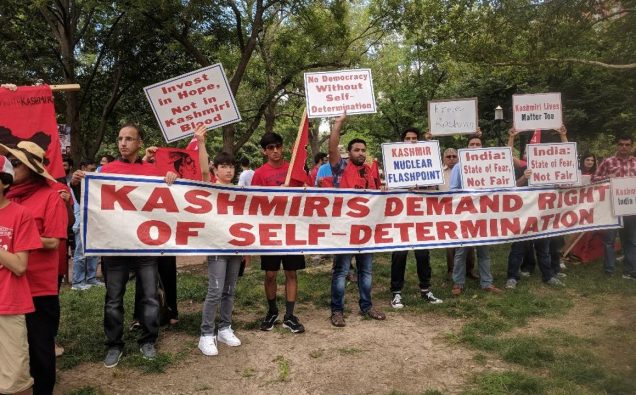
India’s repression has turned Kashmir into a “volcano waiting to erupt,” and it is time that New Delhi lets the people of Jammu and Kashmir to decide their destiny, a top Pakistani diplomat argued.
Writing an op-ed in the New York Daily News, Pakistan’s Ambassador to the U.S. Asad Majeed Khan called Kashmir – which has been under siege since New Delhi’s August 5 revocation of its autonomy – a powder keg of anger and fury.
“Kashmir is too important and too delicate an issue to be ignored indefinitely. It needs resolution now,” Khan wrote, as the people of the region – which India says it has divided into Union territories instead of its previous disputed autonomous status – continue to face restrictions on basic freedoms including communication.
“The only solution is a just settlement of the Kashmir dispute in accordance with the wishes of its people and in line with the UN’s myriad resolutions on the disputed territory,” the Pakistani envoy said in his piece titled: India’s dastardly, dangerous moves in Kashmir.
Indian Prime Minister Narendra Modi – who heads the BJP government that follows Hindutva exclusivist ideology seeking domination of the Hindus over other communities – has defended the decision to lock down Kashmir and annex it, saying the changes would bring economic development to the area.
But the people of Kashmir – the only Muslim majority area under Indian administration – see it as a way to curb their identity with influx of the majority Hindu population.
Meanwhile, the United Nations and human rights organizations have rebuked New Delhi’s clampdown on the entire Kashmir community and denial of rights to freedom of movement, expression and assembly.
New Delhi, on the other hand, says the measures are in place to combat terrorists, who cross from Pakistani Kashmir into the Indian controlled territory. Islamabad has denied the accusation.
In the op-ed Ambassador Khan addressed the question of tensions between the two nuclear-armed neighbors, who partly control Kashmir.
Having failed to normalize its occupation of Kashmir, Ambassador Khan said India was lashing out, blaming Pakistan and gambling that another military escalation on the Line of Control would help the BJP externalize the consequences of its repression.
Pakistan, he wrote, does not want to be dragged into a “manufactured confrontation”, but warned of a response if Pakistani sovereignty was violated.
“India has already tested — to its own cost — Pakistan’s resolve to defend its territory once this year,” Khan said, referring to the effective Pakistani response to India’s air incursion in February this year.
“As Prime Minister Imran Khan warned India in February, wars begin because of miscalculation.”
“It’s time for India to let the Kashmiri people choose their own destiny,” Khan wrote, referring to UN resolutions that give Kashmir people the right to self-determination through a UN-supervised plebiscite.
“Under India’s occupation, they have seen enough dark days,” Khan added.
The question of Kashmiris getting their right to self-determination depends on withdrawal of military troops from the region and would take a much coordinated international effort. India has resisted any such thought, saying Kashmir is its integral part and now a union territory.
The United States has offered to mediate on the dispute if both countries agree to such role. President Trump has renewed the offer several times.
Meanwhile, the U.S. lawmakers continue to condemn Indian actions as contrary to democratic principles and human rights charters.
Two hearings on the Capitol Hill saw India face an unprecedented scrutiny.
In a latest move, U.S. Congressman has written to the U.S. State Department, asking whether India has allowed American diplomats access to the region.

















